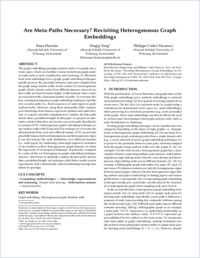Are meta-paths necessary?: revisiting heterogeneous graph embeddings
- Hussein, Rana University of Fribourg, Switzerland
- Yang, Dingqi University of Fribourg, Switzerland
- Cudré-Mauroux, Philippe University of Fribourg, Switzerland
-
2018
Published in:
- Proceedings of the 27th ACM International Conference on Information and Knowledge Management. - 2018, p. 437–446
English
The graph embedding paradigm projects nodes of a graph into a vector space, which can facilitate various downstream graph analysis tasks such as node classification and clustering. To efficiently learn node embeddings from a graph, graph embedding techniques usually preserve the proximity between node pairs sampled from the graph using random walks. In the context of a heterogeneous graph, which contains nodes from different domains, classical random walks are biased towards highly visible domains where nodes are associated with a dominant number of paths. To overcome this bias, existing heterogeneous graph embedding techniques typically rely on meta-paths (i.e., fixed sequences of node types) to guide random walks. However, using these meta-paths either requires prior knowledge from domain experts for optimal meta-path selection, or requires extended computations to combine all meta- paths shorter than a predefined length. In this paper, we propose an alternative solution that does not involve any meta-path. Specifically, we propose JUST, a heterogeneous graph embedding technique using random walks with JUmp and STay strategies to overcome the aforementioned bias in an more efficient manner. JUST can not only gracefully balance between homogeneous and heterogeneous edges, it can also balance the node distribution over different domains (i.e., node types). By conducting a thorough empirical evaluation of our method on three heterogeneous graph datasets, we show the superiority of our proposed technique. In particular, compared to a state-of-the-art heterogeneous graph embedding technique Hin2vec, which tries to optimally combine all meta-paths shorter than a predefined length, our technique yields better results in most experiments, with a dramatically reduced embedding learning time (about 3x speedup).
- Faculty
- Faculté des sciences et de médecine
- Department
- Département d'Informatique
- Language
-
- English
- Classification
- Computer science and technology
- License
- License undefined
- Identifiers
-
- RERO DOC 324413
- DOI 10.1145/3269206.3271777
- Persistent URL
- https://folia.unifr.ch/unifr/documents/307801
Statistics
Document views: 113
File downloads:
- cud_amp.pdf: 392
